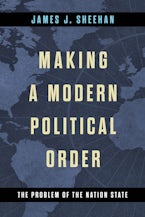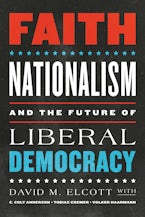Challenges to a political order come from many different directions. Some come from the outside, invading armies, devastating epidemics, natural disasters; others come from within, corrupt leaders, social dislocation, spiritual crises. Even when these challenges are manageable, few political orders meet people’s expectations. There is usually a gap between aspirations and accomplishments, between what people think ought to happen and what actually does occur. Dissatisfaction, distrust, and disappointment are part of most people’s political experience. That is why every important thinker about politics has viewed the world with a certain amount (and sometimes a great deal) of anxiety.
At the beginning of the twenty-first century’s third decade, it is not difficult to find good reasons for dissatisfaction with the present and anxiety about the future. There is nothing new about this. Like its predecessors, the contemporary political order provides many things to be discontented about: corruption, dictatorship, endemic violence, rampant inequality, institutional paralysis—the list goes on and on.
And yet these problems, while surely worrisome and, in some places, cruel and debilitating, should not distract us from the underlying strengths that sustain our political institutions.
In the contemporary world, for example, the infrastructure of most states is more robust than ever before in human history. Governments have an unprecedented capacity to define their territory, count and classify their populations, formulate and enforce laws, and provide services to their citizens. Of course even relatively successful states can and do fail to meet our expectations. States are rarely as fair, efficient, and competent as we wish them to be; most stimulate more demands for services than they can provide; few fulfill their own promise to create a just order. Despite—-or, as some think, because of—-the state’s enormous resources, many people still suffer from the misfortunes that have always been part of the human condition.
Just as states have greater capacity than ever before, in the twenty-first century more people have a greater say in how they are governed. There is no more pervasive and powerful element in our expectations about the political order than the conviction that legitimate authority rests on popular consent. Needless to say, tyranny has not disappeared from the earth. There are plenty of states where consent is a sham, evoked by the more or less overt exercise of corruption and coercion. It is nonetheless significant that even dictatorships feel obliged to call themselves democracies. In functioning democracies, where governments must make some effort to respond to the popular will, there are always disenchanted citizens who believe that the voice of the “people” is not being heard by those in power. States create an appetite for order and justice they usually cannot fulfill; democracies promise a consensual politics that they can rarely deliver.
The faith that legitimate power rests with the people, usually defined as a nation, is sometimes hard to sustain. The history of nationhood was—and is—full of disillusionment because we often do not get the nation we want. Nonetheless, we still expect the world to be divided into national communities for which some people are willing to die (and to kill). Nations, like states, are firmly embedded in our political expectations. Inhabitants of an established nation can take its existence for granted; those who live in a nation at risk or yearn for a nation of their own can become obsessed by the distance between their national aspirations and reality.
One of the characteristics of the modern political order is the fact that, from its origins in the eighteenth century to the present, some have imagined permanent solutions to its drawbacks and deficiencies. These millenarian visions have taken many different forms. Some have indulged in what Francis Fukuyama called “the myth of statelessness” that imagines a world in which the state would wither away. More often these utopias imagine a new kind of community in which what Kant saw as humanity’s “unsocial sociability” would disappear and it would no longer necessary to contend with the strain created by our “tendency to come together in society, coupled, however, with a continual resistance which constantly threatens to break this society up.” The many would be made one, once and for all.
Utopian visions of the future exist at every point on the ideological spectrum. What they all have in common is a willingness to imagine a world without politics. This would be a world in which the bitter conflicts and messy compromises of public life would be transcended, for example, by the embrace of a shared religious faith, or the universal solidarity of the working class, or the autonomous efficiency of the market. These are fantasies and, as history shows us, often dangerous ones. Without politics, communities in the modern world cannot manage the enduring tension between individual desires and collective obligations and thus sustain the “standing miracle” of organized society.
Because it so often engenders expectations that are not, perhaps cannot, be met, the modern political order seems to vacillate between over-confidence and excessive despair. Living with modernity demands that we recognize both its promise and its imperfections. The fact that most of our problems must be managed rather than solved is not a reason to abandon hope but to accept the limitations of our efforts. To act politically, as Michael Oakeshott reminded us, is “to sail on a boundless and bottomless sea; there is neither harbor for shelter nor floor for anchorage, neither starting place nor appointed destination.” But precisely because there is no safe harbor, political action is unavoidable, a voyage on which we must embark. The quest for order is never finished.





